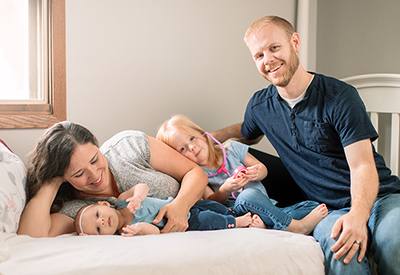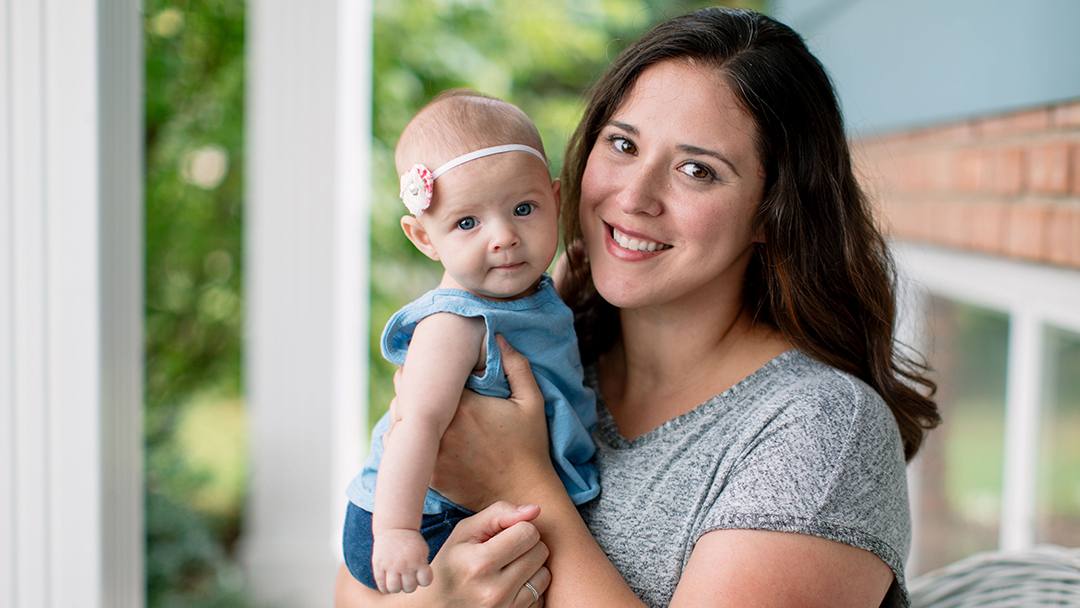-
Sharing Mayo Clinic: Fostering a peaceful pregnancy
A Mayo Clinic prenatal program takes a new approach to improving care for women with low-risk pregnancies.
Two-year-old Quinn Hales confidently places her toy stethoscope against baby sister Finley's chest to listen to her heartbeat. It's a skill she's been honing ever since Finley was just a curiosity in her mom's belly.
When the girls' mother, Sian Hales, was pregnant with Finley, she participated in a program at Mayo Clinic called OB Nest. It seeks to improve the patient experience by reducing the number of prenatal appointments from between 12 and 14 to just eight for low-risk pregnancies.
Expectant mothers with low risks of pregnancy complications are given home monitoring devices to check the baby's heart rate and the mother's blood pressure between appointments. They also have access to an online care community, nurses and a nurse call line to answer questions between visits.
"When we noticed patient satisfaction was declining, we wanted to find a better way to care for expecting moms." — Abimbola Famuyide, M.B.B.S.
"Quinn loved it," Sian says. "Sometimes it would be days before our scheduled monitoring check, and she would ask, 'Are we going to check the baby's heartbeat today?' She would get the jelly for me and sit by me as we found the heartbeat together."
The concept for OB Nest was born out of concerns that the traditional approach to prenatal care — a fixed schedule of 12 to 14 short visits to check for a steady heartbeat and growing baby — no longer was meeting patients' needs and was creating more burden than assurances for the patient and families.
 "When we noticed patient satisfaction was declining, we wanted to find a better way to care for expecting moms," says Abimbola Famuyide, M.B.B.S., chair of the Mayo Clinic Department of Obstetrics and Gynecology.
"When we noticed patient satisfaction was declining, we wanted to find a better way to care for expecting moms," says Abimbola Famuyide, M.B.B.S., chair of the Mayo Clinic Department of Obstetrics and Gynecology.
The clinical team found the help they needed in Mayo Clinic research and design groups. The Department of Obstetrics and Gynecology partnered with service designers in the Center for Innovation, who developed and tested several options aimed at improving the care experience for moms.
Results of this work informed the proposed new model of care — the OB Nest. The model was then evaluated in a clinical trial by researchers in the Mayo Clinic Robert D. and Patricia E. Kern Center for the Science of Health Care Delivery. This team assessed patient outcomes, and evaluated patient and staff perspectives on the new model in practice. Results from the clinical trial found that women had the same quality of care as those who received traditional care, but they had higher satisfaction and less stress and anxiety.
"This fulfills the holy grail of what patients expect today," Dr. Famuyide says. "It expands choices for women and gives them the opportunity to pick what works best for them. That improves patient experience and clinical outcomes, while at the same time keeping costs down."
"I could check my weight and blood pressure in the comfort of my PJs, knowing that if I had any questions or problems, I could just call and talk to a nurse." — Sian Hales
Sian can attest to these benefits. When she was pregnant with her older daughter, Quinn, Sian and her husband, Aaron, had difficulty coordinating prenatal appointments with Aaron's work schedule — and they needed to make arrangement for someone to watch their school-age sons, Easton and Grayson.
"With Finley, it was nice being able to stay home and not always have to find a sitter for appointments," Sian says. "I could check my weight and blood pressure in the comfort of my PJs, knowing that if I had any questions or problems, I could just call and talk to a nurse. And if there was a problem, I could come in. It was always nice to have that comfort."
Assessing your baby's health during — or even before — pregnancyA fetus's DNA can be found scattered throughout the mother's bloodstream after only about 10 weeks of pregnancy. These genetic snippets, called cell-free DNA, can provide insight into the health of a fetus. New tests created with support from the Mayo Clinic Center for Individualized Medicine look at this genetic material to determine the risk for certain inheritable diseases. The tests provide families with a new level of information to help guide health decisions. "Newer developments in perinatal testing are practice-changing," says Myra Wick, M.D., Ph.D., a Mayo Clinic obstetrician. Here are three tests now available to expectant parents:
Research to refine the accuracy of these new tests continues. The tests may not be appropriate for every family. Dr. Wick suggests that couples ask their health care provider about genetic testing. She also recommends that all prospective and expectant parents consult with a medical geneticist or genetic counselor who can help parents choose the right tests, as well as interpret results that reveal inheritable conditions. "These tests are important for safe family planning before pregnancy, as well as for the care of a baby who is found to have a genetic disorder during pregnancy," Dr. Wick says. |
Note: A version of this story was previously published in Mayo Clinic Magazine.
HELPFUL LINKS
- Learn more about prenatal care and healthy pregnancy.
- Read about the Department of Obstetrics and Gynecology.
- Explore Mayo Clinic.
- Request an appointment.








